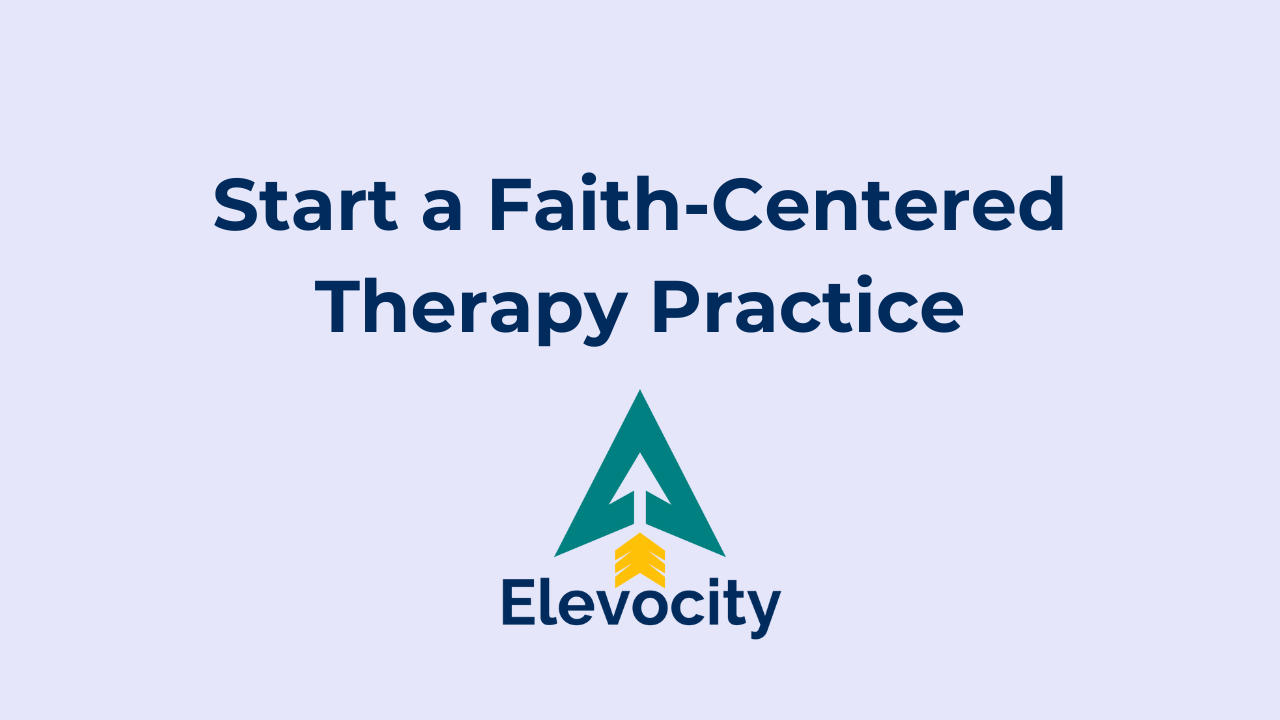How to Start a Faith-Centered Therapy Practice in a Profession that Often Leaves Faith Out
Jul 15, 2025
Practical wisdom for building a Christ-honoring practice with clarity and conviction
Starting a private therapy practice can be exciting, rewarding, and… overwhelming. But for Christian women therapists, there’s another layer to consider: how do you build a practice that reflects your faith in a profession that often feels spiritually neutral—or even resistant to faith-based approaches?
At Elevocity, we believe that you can honor your calling, serve ethically, and boldly weave your Christian worldview into your work—without compromising professionalism or burning out. Here's how.
1. Get Clear on Your Why (and Write It Down)
Before you register your business or choose an EHR, take time to reflect on this foundational question:
Why do I want to build a faith-centered practice?
Maybe your goal is to offer biblically integrated counseling. Maybe you want to create a safe space where women can bring both their anxiety and their prayers. Or maybe you're just tired of feeling like your spiritual values have to be “checked at the door.”
Write your “why” down. Let it shape every decision, from your mission statement to your Instagram posts. Clarity here will anchor you when the world tells you to tone it down—or compromise to get ahead.
2. Define What Faith Integration Looks Like for You
“Faith-centered” doesn’t have to mean quoting Scripture in every session. In fact, a thoughtful approach to integration is one of the most ethical and effective ways to serve clients.
Ask yourself:
-
Will I offer overtly Christian counseling, or a values-based approach informed by Scripture?
-
How will I assess spiritual fit during intakes?
-
Am I open to working with non-Christian clients—and if so, how will I honor their beliefs while staying aligned with mine?
Integration is not one-size-fits-all. The goal is alignment—between your faith, your clinical skills, and your professional boundaries.
3. Don’t Do It Alone—Find a Like-Minded Community
One of the biggest threats to faith-based clinicians is isolation. When you’re the only Christian therapist in your consultation group—or when your ethics professor rolls their eyes at spiritual language—it’s easy to start second-guessing your path.
Find other therapists who get it. Join a mentorship network like Elevocity, connect with a supervisor who shares your values, or attend Christian clinical trainings.
You don’t have to choose between clinical excellence and spiritual integrity.
You can grow both—with the right support system.
4. Create Systems That Protect Both You and Your Clients
It’s one thing to have a strong mission; it’s another to back it up with systems. As a faith-based clinician, your intake paperwork, informed consent, and marketing language should all reflect what clients can expect from working with you.
Consider:
-
A clear faith integration policy in your intake forms
-
A website FAQ that defines your approach and who you serve
-
Boundary-setting templates for when clients challenge your spiritual lens
These systems protect your ethical integrity and help clients make informed decisions.
5. Expect to Stand Firm (And Learn to Rest)
Let’s be honest: choosing to build a faith-centered practice means you may face pushback. You might lose referrals, feel misunderstood in professional spaces, or be tempted to compromise to “fit in.”
This is why soul care matters.
Practice taking care of yourself spiritually. Set boundaries. Let go of hustle culture. Trust that God is building something through you, even when it grows slowly.
Your practice is not just a business—it’s a ministry.
Final Thoughts
Starting a faith-centered therapy practice isn’t always easy—but it’s deeply needed. In a world that often sidelines faith, your willingness to integrate clinical skill with spiritual wisdom offers clients something rare and powerful: wholeness.
At Elevocity, we’re here to support you every step of the way—with resources, mentorship, supervision, and community designed specifically for Christian women therapists like you.
Want to go deeper?
- Join our Aligned Therapist Network — a free, supportive community where Christian therapists grow personally and professionally
- Check out our LPC Supervisor Directory to find a faith-aligned mentor
- Explore our upcoming faith-based courses to build your practice with purpose
Written by Lisa Roark, M.Ed., LPC-S
Founder of Elevocity, where Christian women therapists are equipped to build purpose-driven practices rooted in faith and excellence.
Looking for resources, connections, and services that align with your Christian values?
At Elevocity, we help Christian therapists — whether you’re an LPC Associate, Supervisor, course creator, or practice owner — grow your career and ministry. From faith-aligned supervision and mentorship to admin support and course hosting, we’re here to help you serve others with excellence.
👉 Explore how Elevocity can support your calling
Have Questions or Want to Connect?
Whether you’re exploring LPC supervision, looking to list yourself as a Supervisor, interested in admin support, or curious about hosting your course, we’d love to hear from you.
🔹 Ask about our services
🔹 Learn more about Elevocity
🔹 Share your ideas or feedback
Fill out the form below, and we’ll get back to you soon!
We hate SPAM. We will never sell your information, for any reason.

